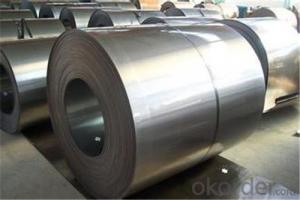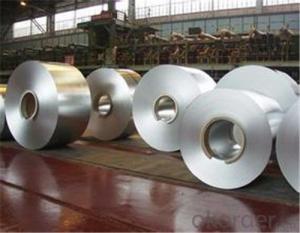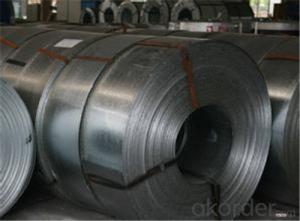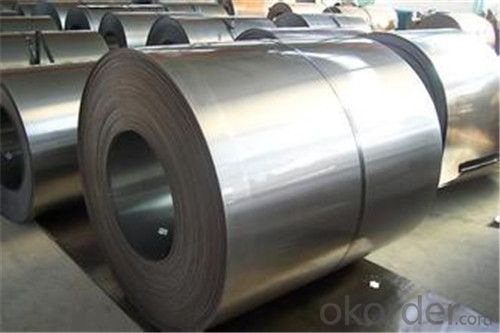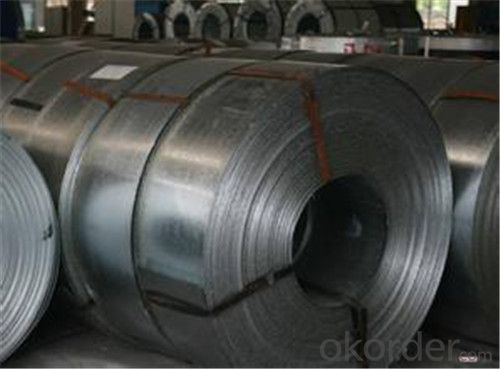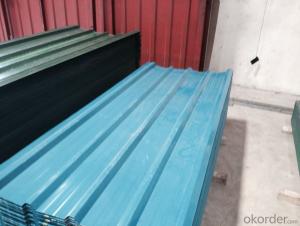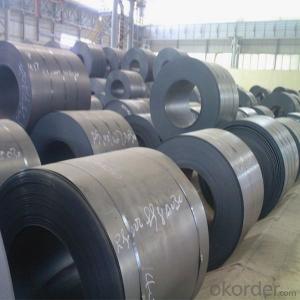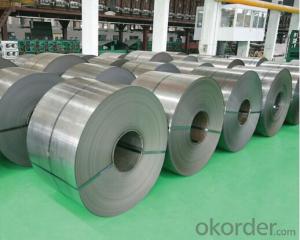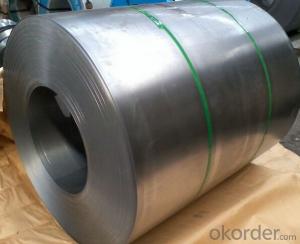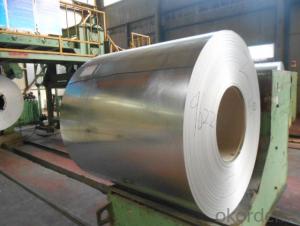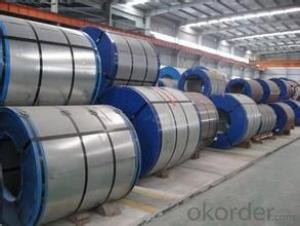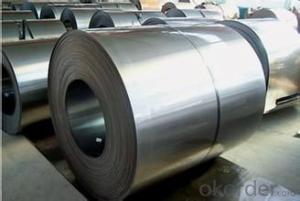Cold Rolled Steel Plates with High Quality from China
- Loading Port:
- Tianjin
- Payment Terms:
- TT OR LC
- Min Order Qty:
- 180 m.t.
- Supply Capability:
- 89000000 m.t./month
OKorder Service Pledge
OKorder Financial Service
You Might Also Like
Description of cold rolled steel coil :
The raw material of cold rolled steel coil/sheet is high quality hot rolled product, and after pickling, kinds of new technology and new process of global cold rolling production have been applied. Therefore the manufacturing, home appliance, automobile etc.
Specification of cold rolled steel coil :
standard | AISI, ASTM, DIN, GB, JIS |
Steel Grade | Q195/Q195L/st12/dc01/spcc |
Thickness | 0.15-1.5mm |
Width | 500-914mm |
Length | coil |
Place of Origin | Shandong,china(mainland) |
Producing ablity | 500,000 Tons/month |
Type of payment | T/T, L/C |
Packing | As per customer's requirement |
Delivery | 30days after contract |
Price | FOB&CIF |
MOQ | 20Tons |
Packaging & delivery of cold rolled steel coil :
Packaging Detail: | Oil coated, metal shell and anti-rust paper with corner protected by sheet or coil |
Delivery Detail: | 30 days after receiving deposit or L/C |
Application of cold rolled steel coil :
1. Refrigerators, cabinets, power distribution baords and drums.
2. Automobile floor and roof panels.
3. Automobile fenders and quarter panels
4. Automobile fenders and quarter panels
Images of cold rolled steel cold rolled steel coil:
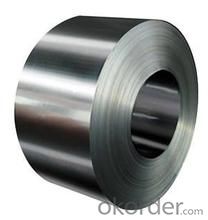
FAQ
1.What's your MOQ?
50MT, it is for one container.
2.Whether your company have QC teams?
Yeah, sure, our QC team is very important, they will keep the quality control for our products.
3. What's your normal delivery time?
Our delivery time about 10-20days for standard sizes, if you have other requirements like hardness and width ,it is about 20-40days. But don't worry ,we also try our best for the
- Q: Is it just because brass is reloadable? But what makes it reloadable? What does brass bring to the equation that the steel cased ammo can't do?
- Brass is slightly softer than annealed steel. Both can be reloaded, once or maybe even twice. But STEEL has a tendency to WORK HARDEN, becoming brittle. Which is why it's used for tools and other applications where work hardening is a plus. It's actually designed to do that. Brass does not work harden, because it is a different sort of metal. That's the main reason.
- Q: What are the different types of steel coil edge conditioning methods?
- There are several different types of steel coil edge conditioning methods, including slitting, cutting, shearing, and edge rolling. Slitting involves cutting the coil into narrower strips, while cutting involves separating the coil into smaller sections. Shearing is a process of cutting the edges of the coil to remove any irregularities or defects. Edge rolling is a method that involves rolling the edges of the coil to create a smoother and more uniform finish.
- Q: Several reading methods of steel tape measure
- Indirect reading methodIn some parts of the steel tape can not be used directly, can use the ruler or ruler, the zero alignment measurement, ruler and measurement direction; steel tape measure distance to a whole scale ruler or ruler, with more than a long reading amount. (3).Some errors in measuring steel tape
- Q: In pounds per square inch what is the tensile strength of strong steel?
- Depends on what you mean by strong steel. Typically the ultimate strength/yield point of steel used for building structures (beams, columns, joists, plates) is in the range of 36,000 to 50,000 psi. The strength is specified by the designer (in the U.S.) by its ASTM designation. e.g. ASTM A36, A572, A500, A307, A325 ... A36 is typical mild steel, A572 Grade 50 (50,000 psi) is often called high-strength Really high strength steels such as pre-stressing strand can have ultimate strengths more than 10 times these values.
- Q: Building the bulwurk, general use on trawlers. What kind of steel is best suited.
- How big is your trawler going to be and what use, The ones you see off the Alaska Coast or a Gulf Coast Shrimper? My preference in today's economy would not make sense and that is Aluminum.....not steel at all, maybe even Fiberglass, but $$$$ talk so Steel is cheaper, but you need to know what you are doing. The designer of the hull should have specified the right /preferred grade. It today's world there are many more choices available. You use a mild steel, most often grade A or B, but some applications call for grade D. Check your blue prints and list of materials. Edit. Ok I understand. There are 2 ways to go. One is use a relatively cheep steel and use higher cost epoxy primers and paint, often requiring special surface preparation just before priming, or two, using a much higher cost steel with more chrome and nickel in it. Grades that begin with #3xxx These are weldable with rods that are available, and can be welded directly to mild steels. However these are 3X the cost. If your a Shrimper, I'm guessing gulf coast. I worked with several boat yards in the 70's installing spray urethane foam for insulating there holes. So I've been around lots of small yards from Florida to Texas. I'd call the nearest steel warehouse and ask what they would recommend. You might find what you want at a scrap yard. I've lucked out several times picking up 1/4 plate scrap$ and I'd bet the scrapyard guy would know just what you need. I know there are places to get what you need in Mobile and New Orleans. Good luck!
- Q: If I wear a pair of thick wool socks, is walking around in the snow with steel-toed boots going to be a problem? I'm wondering if the steel will make my toes too cold.
- Dr. Martens makes a number of pairs of steel toed work boots. I have never owned a pair of their steel toes, but I have owned several pairs of their shoes and boots, the oldest of which is fifteen years old and still going strong. They take a couple of weeks to break in, but once they do, they are practically molded to your foot. They are more expensive, but they last a LONG time. Good Luck!
- Q: What processes and materials are used in the production of chrome steel
- well, save up some more $$. I wouldnt feel safe on a $120 mountain bike. My advice would be to invest in something that's a little more money. Also, why do you want a steel frame? Aluminum frames today are made from 7005 alloy, and stack up very well compared to the durability of steel. Plus, they wiegh alot less. Nowadays, youll only find steel on a cheap walmart bike, ir a top notch downhill bike made for extream offf road conditions.
- Q: i have noticed in guns, and artillery the shell casings are always made out of brass. brass is expensive, weaker and dosnt look as good as steel. so why use it for casings? i am aware some of the case must be deformed. but just a small brass percussion cap could be used just for that and steel for the rest. whats going on?
- Expansion and more resistant to rust. Besides, steel cased ammo is made in East Eur..abia in all kinds of calibers but many people complain about it not being able to expand or that the steel wears out the extractor faster (not true), then they go and buy some.
- Q: Can steel coils be coated with fire-resistant materials?
- Yes, steel coils can be coated with fire-resistant materials.
- Q: I'm kind of confused as to how the difference between a stainless steel and blued steel firearm is sometimes only $20 or so. Isn't stainless steel fairly more expensive to manufacture than plain carbon steel? Are some stainless steel firearms simply stainless steel finished with carbon steel underneath?
- No, there are no rifles produced that are carbon steel underneath with a stainless steel finish. Typically, gun prices are set by whatever people will pay for the finished product, NOT based on what the material costs actually are. Even if the stainless were CHEAPER to produce, manufacturers could still charge a premium on those products because it offers an advantage to the user (less maintenance). Stainless is seen as an upgrade because of the maintenance and the good looks, so it's like an upgrade option on a sports car, even if it doesn't improve actual performance, it improves the marketability for the product, so it increases the product price. For rifle barrels, many manufactures do NOT charge a high mark up for stainless steel because even though YES is is harder to machine, they don't have to blue the part, which is an extra processing step, and extra materials cost. So when a stainless steel blank is made, it is machined, washed, and finished, but a chrome-moly barrel much be machined, washed, prep'd, hot blued, and finished.
Send your message to us
Cold Rolled Steel Plates with High Quality from China
- Loading Port:
- Tianjin
- Payment Terms:
- TT OR LC
- Min Order Qty:
- 180 m.t.
- Supply Capability:
- 89000000 m.t./month
OKorder Service Pledge
OKorder Financial Service
Similar products
Hot products
Hot Searches
Related keywords
